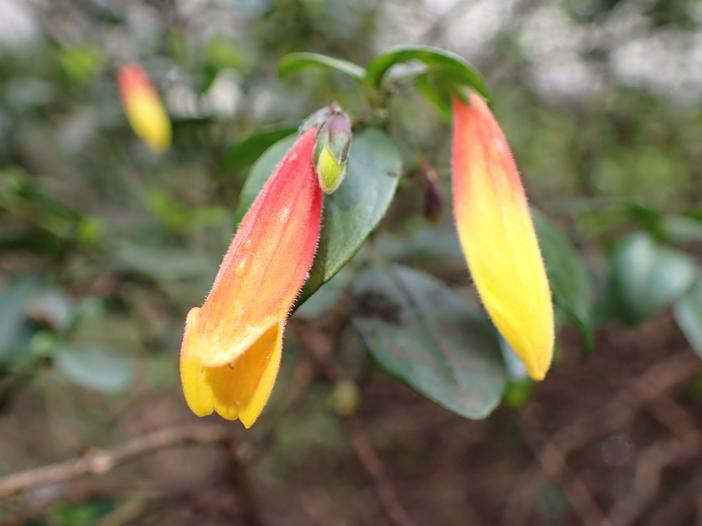Brazilian Fuchsia
(Justicia floribunda)
Brazilian Fuchsia (Justicia floribunda)
/
/

Krzysztof Ziarnek, Kenraiz
CC BY-SA 4.0
Image By:
Krzysztof Ziarnek, Kenraiz
Recorded By:
Copyright:
CC BY-SA 4.0
Copyright Notice:
Photo by: Krzysztof Ziarnek, Kenraiz | License Type: CC BY-SA 4.0 | License URL: https://creativecommons.org/licenses/by-sa/4.0 | Uploader: Kenraiz | Publisher: Wikipedia Commons


















Estimated Native Range
Summary
Justicia floribunda, commonly known as Brazilian Fuchsia, is an evergreen subshrub native to the Atlantic Forest biome in Southern Brazil, Paraguay, and Northeastern Argentina, where it thrives in the understory of humid forests. This plant typically grows to 30–60 cm (12–24 in) in both height and width. It features downy stems and leaves, with a distinctive phyllotaxy where each pair of leaves has one leaf smaller than the other. Brazilian Fuchsia is admired for its spikes of nodding, tubular flowers that exhibit a striking color gradient from yellow to scarlet at the base, blooming prolifically in the fall, winter, and spring months. The flowers are particularly showy, making it a favored ornamental plant.
Brazilian Fuchsia is celebrated for its extended flowering season and vibrant blooms, which have earned it the Royal Horticultural Society’s Award of Garden Merit. It is often utilized in tropical and subtropical gardens for border planting, as an accent plant, or in containers. Due to its frost sensitivity, it is commonly grown under glass in temperate regions. Cultivation requires protection from frost, and it thrives in full sun to part shade. It has low to medium water needs and prefers soils with medium drainage. While generally pest-free, it can occasionally suffer from aphids or whiteflies, especially when grown indoors or in greenhouses.CC BY-SA 4.0
Brazilian Fuchsia is celebrated for its extended flowering season and vibrant blooms, which have earned it the Royal Horticultural Society’s Award of Garden Merit. It is often utilized in tropical and subtropical gardens for border planting, as an accent plant, or in containers. Due to its frost sensitivity, it is commonly grown under glass in temperate regions. Cultivation requires protection from frost, and it thrives in full sun to part shade. It has low to medium water needs and prefers soils with medium drainage. While generally pest-free, it can occasionally suffer from aphids or whiteflies, especially when grown indoors or in greenhouses.CC BY-SA 4.0
Plant Description
- Plant Type: Subshrub
- Height: 1-2 feet
- Width: 0.5-1 feet
- Growth Rate: Moderate
- Flower Color: Yellow, Red
- Flowering Season: Fall, Winter, Spring
- Leaf Retention: Evergreen
Growth Requirements
- Sun: Full Sun, Part Shade
- Water: Medium
- Drainage: Medium
Common Uses
Bee Garden, Bird Garden, Butterfly Garden, Deer Resistant, Drought Tolerant, Hummingbird Garden, Low Maintenance
Natural Habitat
The understory of humid forests in the Atlantic Forest biome
Other Names
Common Names: Bandera Española, Vinterjakobinia
Scientific Names: , Justicia rizzinii, Justicia floribunda, Jacobinia pauciflora, Justicia pauciflora, Libonia floribunda, Sericographis pauciflora, Sericographis pauciflora var. speciosior, Sericographis pauciflora var. umbrosa, Ecbolium pauciflorum
GBIF Accepted Name: Justicia floribunda (C.Koch) Wassh.